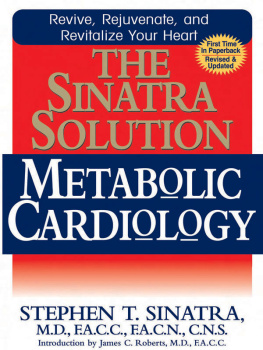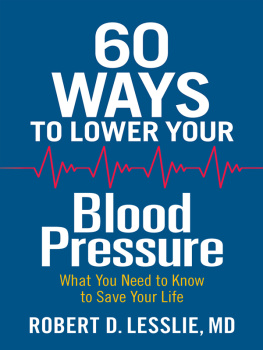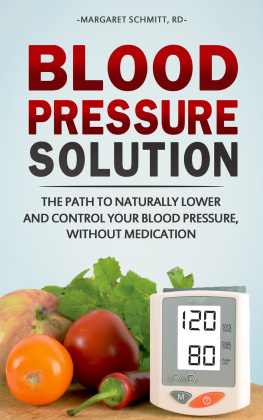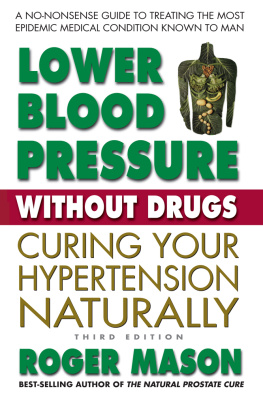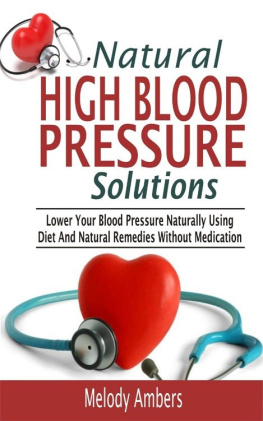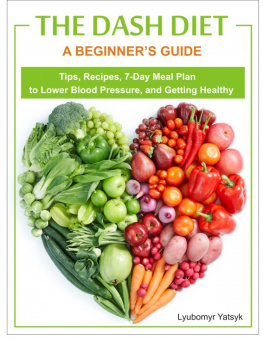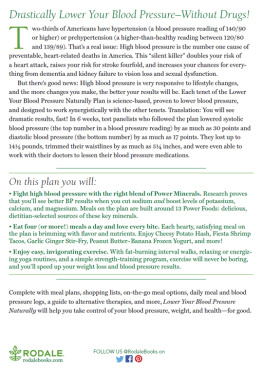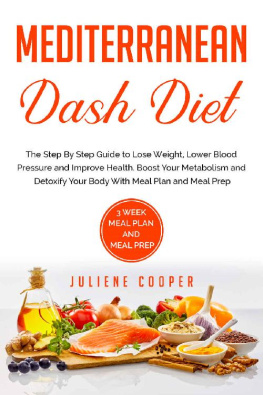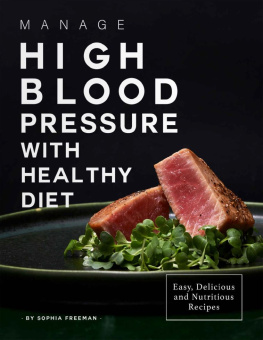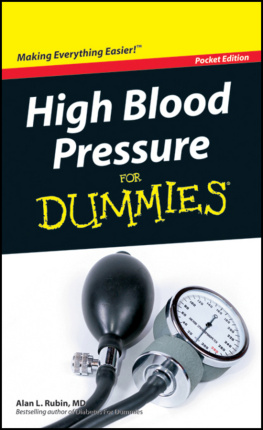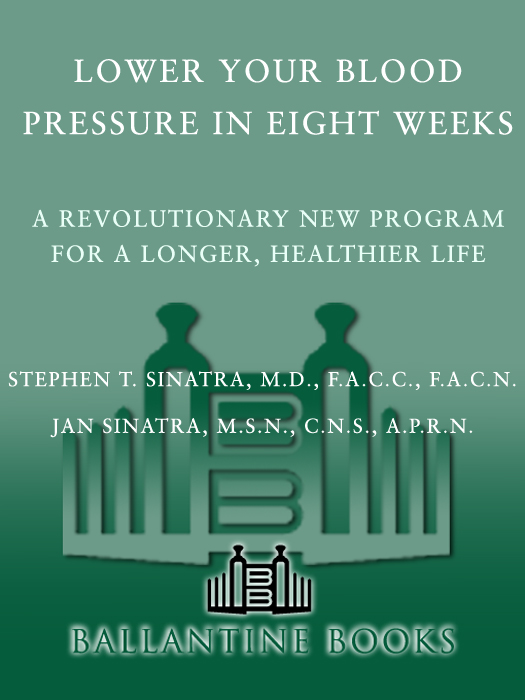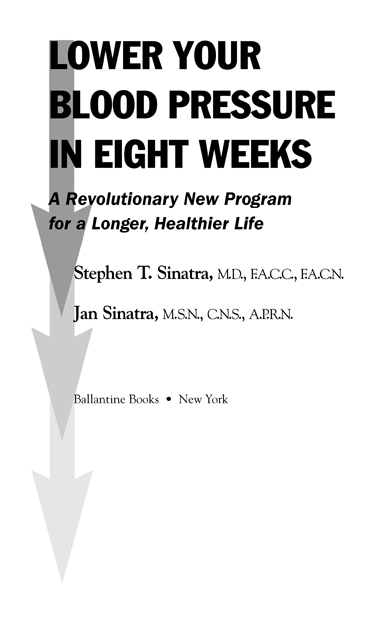A Ballantine Book
Published by The Random House Publishing Group
Copyright 2003 by The New England Heart Center
All rights reserved.
Published in the United States by Ballantine Books, an imprint of The Random House Publishing Group, a division of Random House, Inc., New York, and simultaneously in Canada by Random House of Canada Limited, Toronto.
Ballantine and colophon are registered trademarks of Random House, Inc.
www.ballantinebooks.com
Library of Congress Cataloging-in-Publication Data
Sinatra, Stephen T.
Lower your blood pressure in eight weeks : the revolutionary new program for a longer, healthier life / Stephen T. Sinatra and Jan Sinatra. 1st ed.
p. cm.
1. HypertensionPopular works. 2. HypertensionPreventionPopular works. I. DeMarco Sinatra, Jan. II. Title.
RC685.H8 S564 2003
616.132dc21 2002034464
eISBN: 978-0-307-48777-3
v3.1
Contents
Introduction: Theres No Fooling a Nurse
by Jan Sinatra, M.S.N., C.N.S., A.P.R.N .
Theres No Fooling a Nurse
by Jan Sinatra, M.S.N., C.N.S., A.P.R.N.
I am grateful for the opportunity to introduce my husband to readers of this book. Youll soon be excitedly turning the pages to read about how to lower your blood pressure on his straightforward plan. I know its a good one, because Im a cardiac nurse myself. As dedicated as he is to treating cardiac problems such as hypertension, my husband is practically obsessed with preventive medicine. If you take the time to read his story, I think youll understand why. Id like you to meet Steve Sinatra the man in order to better understand what motivates Dr. Sinatra the physician and how he came to write this book.
Theres a lot Steve hesitates to share about himself, but I feel its important that you see him as a person, not just as a doctor. When you do, I think youll understand better why hes so carefully chosen the path hes followed in his own life, and why what he has to offer you is so valuable. Its also my hope and prayer that reading his personal story will, just maybe, give you cause to take a moment to reflect on your own story, and why youre here at this point in your life, selecting this particular book for yourself.
IN THE BEGINNING
My first meeting with Dr. Stephen Sinatra was a telephone conversation. They wouldnt put my call through to Moms hospital room for some reason. I was at home, getting my children off to school. Little did I know that Dr. Sinatra had just brought my dear mother back to life minutes before he picked up the phone at the nurses station to speak with me.
You see, one summer when she was in her late fifties, Mom developed an irregular heartbeat. Her first morning in a hospital for observation, Moms arrhythmia took a drastic turn for the worst. Abruptly, without warning, her heart just stopped. Her skipping heart had paused but hadnt restarted itself. Her monitor alarm went off, and many hospital personnel rushed through the halls to save her. Steve quickly responded when he heard the code blue called to her room.
Mom had neither a pulse nor a heartbeat. In between CPR compressions, Steve quickly and expertly threaded an emergency pacemaker wire into her heart chambers. Remember, Im a cardiac nurse, and Ive never heard of a physician being able to do that! Most cardiologists would have waited for the benefit of fluoroscopy that day, in order to visualize their path as they snaked that pacing wire into the heart.
But there was no time to wait for X rays, so Steve saved my moms life by feeling his way into her heart chambers with this precious lifeline. The pacemaker successfully captured a new heartbeat then a second then a third. Mom had herself a second lease on life. Needless to say, as a nurse, I was only a bit short of dazzled by Steves skill as a cardiologist. And as a daughter, I was incredibly touched and grateful to have my mother back with us. But thats Steve: a quick and decisive thinker when the chips are down.
It would be many years later that I would come to know Steve better when we worked at the same hospital. It was then that I came to realize that his emergency room skills were only a very small part of his medical expertise. His uncompromising commitment to promote the very best care for his patients has made him the type of doctor that you too can count on. You see, theres no fooling a nurse who works alongside doctors all day long. For my husband, medicine isnt just a career; its a calling shaped by his own personal experiences of health and loss, life and death.
MY HUSBANDS HEART BREAKS, TOO
As cardiologist and CCU nurse, wed resuscitated many a close call together in our coronary care unit over the years. But it would be one fate-filled New Years Eve when I would come to appreciate how tragedy had touched Steves own family life as well. We were both single parents then. I was on duty in the CCU. Hed traveled to Long Island with his young son to spend New Years Eve with his parents after a conference hed planned to attend had been canceled. His last-minute change in plans was more than a chance eventI believe that God meant him to be there for his father that afternoon.
Steve had barely made it through the front door of his childhood home when his father called for help, then collapsed on an upstairs bedroom floor. The son worked frantically to revive his own dad, but to no avail. Steves father died in his arms.
Steve called the CCU that evening to talk, still in shock. Tears always well up in my eyes when I recall Steves anguish that night. Over and over he kept repeating, With all I know, with all Ive trained hard to do, I couldnt even save my own dad!
Steve was soon to learn that no one could have saved his father that heartbreaking day. An autopsy revealed that his aorta had suddenly ruptured, with no warning signs. God had called him home.
Losing his dad was a shock to Steve and his whole family. You see, no one had really worried about Dads health. He was the strong one, the vibrant one, so full of energy, life, and love. It was his mom who was always the big concern. Shed been so frail for so many years.
One of the things that I feel makes Steve a truly great cardiologist is his ability to anticipate what could go wrong with each patient, and intervene in advance as much as possible. He doesnt have a crystal ball, mind you, though sometimes I do tease him about his overly developed sense of dread. But, I also understand all too clearly where his medical intuition came from and why it makes him a cutting-edge physician.
CHILDHOOD HEARTBREAKS
Steve had learned all too early that life can be tenuous. He was just a ten-year-old boy, enjoying a safe and secure childhood, when his mom started losing her eyesight from glaucoma at only thirty-five years of age. Imagine! She was terrified of going blind, as her own mother had. In those days, the 1950s, this eye malady was treated with huge doses of corticosteroids. Looking back, Steves still not convinced that physicians back then really knew for sure what they were doing with glaucoma, despite their best intentions. The results of treatment with such strong drugs were devastating.
Long-term steroid therapy caused Steves mom to develop diabetes. Mom was a very brittle diabetic, meaning that her blood sugar levels were nearly impossible to control. It was not unusual for ten-year-old Steve to come home from school to find his mother unconscious on the kitchen floor in a diabetic shock or coma. He had to have been terrified on a daily basis that his mother would die and his world would fall apart. In fact, when I first met Steves seventh-grade girlfriend, she told me that even then he spoke of wanting to fix his mom, and wrote school papers about finding a way to do so.


